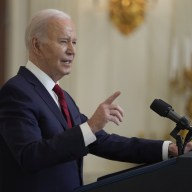If Morgan Spurlock gets his way, you won’t be able to avoid We the Economy, the series of 20 shorts films curated by the “Super Size Me” director that aims to tackle giving the general public a better understanding of the principles that drive our economy through dynamic and entertaining means.
This is a pretty noble endeavor, trying to educate people on what’s considered such an unnecessarily complex topic.
I think we live in a country where most of us think that somebody else has our best interests in mind or somebody else is taking care of it and we don’t need to worry about it. We don’t read the Wall Street Journal every day or turn on CNBC or watch any market news reporting. We feel overwhelmed by it. So we cooked up this idea to make it fun and accessible.
Where would you put yourself on the understanding economics spectrum?
I mean, I think there’s certain things that I understand, but you watch James Schamus’ film about money and you suddenly realize, “Wow, I really don’t know much about anything.” And so for me, I think that the beauty of this series is no matter how much you think you know or how much you understand, there are going to be little things that are going to just open your eyes or make you look at the world a little differently.
 Morgan Spurlock (right) in his We the Economy short, “Caveonomics.”
Morgan Spurlock (right) in his We the Economy short, “Caveonomics.”
How do you think the national attitude to economics and its experts, about Wall Street, has changed since 2008?
You would think that on the heels of all of the skepticism that people have towards businesses or big corporations they feel are working against them, there would’ve been a much larger level of people wanting to become educated about it, but I don’t think that’s the case at all. So that’s why I think something like this is invaluable in getting people just to start to have a primer into market economics, understanding how it works and functions. We should want to learn more, we should want to know more. At the end of the day, the only person who has your best interests in mind is you.
Why do you think that didn’t happen?
I think a lot of these are big, scary topics and difficult to understand. The moment you open up any type of economics textbook, by page seven you’re asleep on some desk somewhere. (laughs) It’s not something that makes for compelling or engaging reading. It’s not something that makes for compelling education. So how do you do that in a way that will kind of keep an audience attuned and interested? And I think what these films do a good job of doing is just that.
The distribution model is interesting with this. You’re kind of putting it everywhere.
The biggest thing was all of us agreeing that we were going to give these movies away for free. Once you do that, then you open yourself up to a world of possibilities. Then you can really make “coop-etition” a real thing. There are times when distributors are going to compete with each other, but there are other times where topics are important enough or stories are large enough that they should cooperate with one another. So out of that we’ve created this amazing “coop-etition” distribution model where we’ve got 55-plus distribution outlets now from Netflix to InDemand to Landmark Cinemas to Yahoo, AOL, you name it. I mean, it is a vast reach that we have. So wherever you consume media, no matter where that may be, no matter what you watch, where you read the news, there’s going to be a story about this and there’s going to be links to this and there’s going to be a place where you can watch these films. One of the biggest goals for us was when we put them out for them to be unavoidable, that wherever they were, you’re part of this conversation.
We the Economy will be available for free across the Internet starting October 21.
















